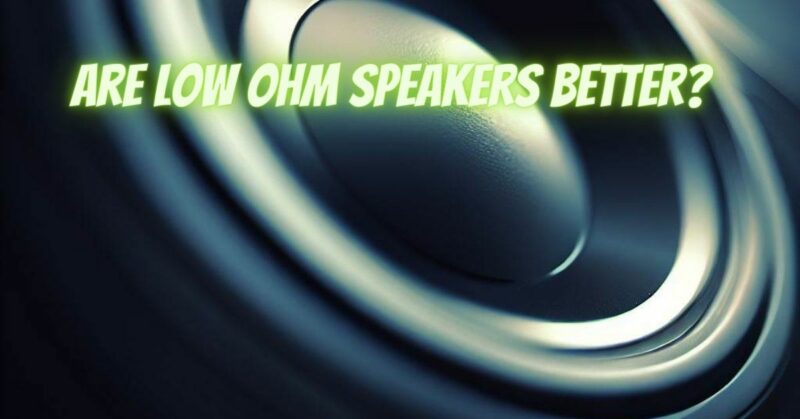When delving into the world of audio equipment, particularly speakers, the term “speaker impedance” often surfaces. Impedance is measured in ohms (Ω) and plays a significant role in how efficiently speakers interact with amplifiers. Among the options available, low ohm speakers are often a topic of interest. In this article, we’ll explore the advantages and drawbacks of low ohm speakers to help you make an informed decision based on your audio needs.
Understanding Speaker Impedance
Speaker impedance is the electrical resistance a speaker presents to the amplifier’s output signal. It’s crucial to match the impedance of the speaker with that of the amplifier to ensure optimal performance and prevent potential damage. Common impedance ratings for speakers include 4Ω, 6Ω, and 8Ω.
Advantages of Low Ohm Speakers
1. Increased Power Transfer: Low ohm speakers generally allow for higher power transfer from the amplifier. This means they can handle more electrical current, resulting in potentially louder sound output. If you’re seeking powerful audio in a larger space, low ohm speakers could be beneficial.
2. Efficient Energy Use: Low impedance speakers can be more power-efficient. They require less voltage to achieve a specific sound level compared to higher impedance speakers. This efficiency can result in improved battery life for portable devices and reduced strain on amplifiers.
3. Enhanced Bass Response: Lower impedance can lead to better control over the movement of the speaker’s cone, particularly in the low-frequency range. This can result in tighter and more impactful bass response, which is particularly desirable for audio enthusiasts and professionals.
4. Flexibility with Amplifiers: Low ohm speakers can often be used with a broader range of amplifiers. Many amplifiers are designed to handle lower impedance loads, making it easier to find a compatible setup.
Drawbacks of Low Ohm Speakers
1. Amplifier Compatibility: While low ohm speakers offer compatibility with a wider range of amplifiers, it’s crucial to ensure that your amplifier is rated to handle the lower impedance load. Using an amplifier not designed for low impedance speakers can lead to overheating, distortion, or even amplifier damage.
2. Heat Generation: More power transfer also means more heat generation, both in the amplifier and the speaker. Adequate ventilation and cooling become more important in low ohm setups to prevent overheating.
3. Potential Distortion: Pushing an amplifier to its limits to drive low ohm speakers can lead to distortion and reduced audio quality. This is particularly noticeable at higher volumes.
4. Higher Current Demands: Low impedance speakers draw more current from the amplifier. This can put additional strain on the amplifier’s power supply, potentially affecting its stability and longevity.
The decision of whether low ohm speakers are better depends on your specific audio goals and the compatibility of your equipment. Low ohm speakers can provide increased power transfer, better bass response, and efficiency, but they come with considerations such as amplifier compatibility and potential heat generation. When considering low ohm speakers, ensure that your amplifier can handle the load, and take into account factors like room size, listening preferences, and budget. By understanding the advantages and drawbacks, you can make an informed choice that aligns with your audio aspirations and provides an enhanced listening experience.


